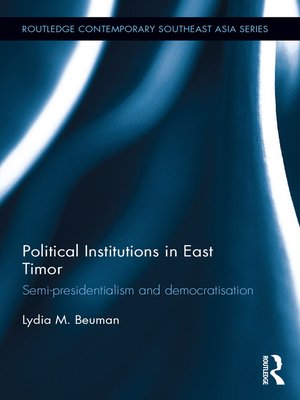Political Institutions in East Timor
ebook ∣ Semi-Presidentialism and Democratisation · Routledge Contemporary Southeast Asia
By Lydia Beuman

Sign up to save your library
With an OverDrive account, you can save your favorite libraries for at-a-glance information about availability. Find out more about OverDrive accounts.
Find this title in Libby, the library reading app by OverDrive.



Search for a digital library with this title
Title found at these libraries:
| Library Name | Distance |
|---|---|
| Loading... |
In 2002, East Timor became an independent state following a long conflict with Indonesia, and went on to adopt a semi-presidential form of government. In a semi-presidential system there is a directly elected fixed-term president, prime minister and government who are collectively responsible for the legislature. Over 50 countries in the world have adopted such a system.
This book examines the politics of semi-presidentialism in East Timor from 2002-2012 and post-2012 political developments. It analyses the impact of semi-presidentialism on the performance of East Timor's democracy, and looks at whether semi‐presidentialism encourages power sharing between competing forces, or whether it provoke a power struggle that threatens democratic stability. Using East Timor as a case study, the author explains whether the adoption of semi-presidentialism helps or hinders the process of democratisation in new democracies.
It is of interest to researchers in the fields of Political Science, Conflict Resolution and Asian Studies, in particular Southeast Asian Politics.







